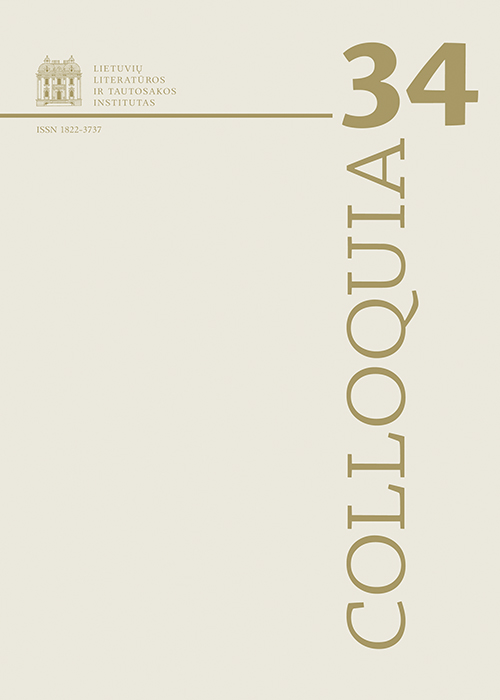The Prose of Marius Katiliškis: Artistic Contours of the Monistic Worldview
Abstract
In this article the author seeks to view novelist Marius Katiliškis’s oeuvre within the framework of European literary tradition, to draw attention to remnants of early twentieth century art’s monistic worldview in the writer’s narratives, and to highlight his artistic expression of the monistic worldview. The author of the article grounds her analysis in the philosophical concept of monism and in studies of its diffusion in late European Romanticism, and in German literary studies (Monika Fick, Marianne Wünsch) of twentieth century literary monism and shifts in literary systems (realism – modernism).
Early twentieth century modern European art probed the sensory aspect of human nature and the irrational as important instruments for grasping the unity of the world. The author of the article applies these aspects to her reading of Katiliškis’s prose. A review of narrative strategies allows her to make the convincing argument that Katiliškis’s realistic representation and epic narrative are complemented with twentieth century innovations. The sensory emphasis that is characteristic of his understanding of the world is an instrument that allows him to connect the human and nature as closely together as possible, and to search for a single, foundational principle. The monistic view of the world gives realistic representation greater depth, as attention to social and psychological human relations is complemented by a sense of the unity of life and a mystical dimension: Katiliškis brings monism’s key concepts about the universal basis of life to the traditional human/nature relationship.
Downloads
Most read articles by the same author(s)
- Rita Tūtlytė, Deep Diving or Swimming Freestyle , Colloquia: Vol. 55 (2025): Colloquia
- Rita Tūtlytė, An Attempt to Reconstruct the Generation of Žemininkai: Benediktas Labėnas , Colloquia: Vol. 49 (2022)
- Rita Tūtlytė, “To Realize the Grace of Being on One’s Only Earth” , Colloquia: Vol. 52 (2023): Colloquia
- Rita Tūtlytė, Greimas’ Criticism and Criticism of Greimas , Colloquia: Vol. 44 (2020)
- Rita Tūtlytė, Primal Images of a Peaceful Being: Tracing a Novel (Works by Alfonsas Nyka-Niliūnas and Adalbert Stifter) , Colloquia: Vol. 45 (2020)
- Rita Tūtlytė, About the Exact Confluence of Words: Translations and Evaluations of Judita Vaičiūnaitė’s Poetry , Colloquia: Vol. 39 (2017)
